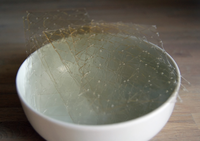
Photo from wikipedia
In recent years, double-network (DN) hydrogels with high mechanical strength and toughness have been developed as promising materials, such as absorbents, tissue scaffolds and wastewater treatment agents. Herein, we present… Click to show full abstract
In recent years, double-network (DN) hydrogels with high mechanical strength and toughness have been developed as promising materials, such as absorbents, tissue scaffolds and wastewater treatment agents. Herein, we present a novel DN hydrogels, which were prepared by micellar copolymerization of acrylamide (AM) and a rosin-based crosslinking agent (FPA–PEG200–AC) in a micellar solution of sodium dodecyl sulfate (SDS). The hydrogels using a rosin-based crosslinking agent (RPAM hydrogels) could form both chemical crosslinks and crosslinked centers for hydrophobic association to enhance mechanical strength. The formulated hydrogels exhibited high elongation ratios at break (500–1500%) and excellent compressive strain (>95%). Also, with an increase in the amount of crosslinking agent, the elongation at break and swelling ratio decreased. The surface morphology of the hydrogels was observed by scanning electron microscopy (SEM), while the thermal properties were characterized by thermogravimetric analysis. The results indicate a successful synthesis of the double-network (DN) hydrogels with high mechanical strength. The RPAM DN hydrogel synthesis can open fresh avenues for the design and construction of DN systems, broadening the scope of the current research and applications of hydrogels with excellent mechanical properties.
Journal Title: RSC Advances
Year Published: 2017
Link to full text (if available)
Share on Social Media: Sign Up to like & get
recommendations!